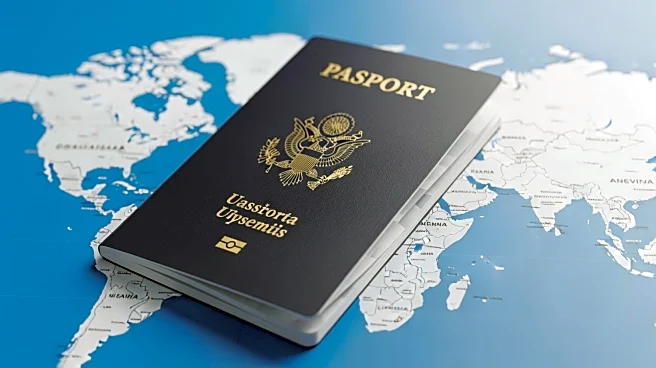What's Happening?
The U.S. passport has fallen out of the top 10 most powerful passports globally for the first time in 20 years, according to the latest Henley Passport Index. This index ranks countries based on the number of destinations their passport holders can visit
without needing a visa. The U.S. passport is now ranked 12th, tied with Malaysia, marking a decline from its previous positions of seventh last year and first a decade ago. The decline is attributed to a fundamental shift in global mobility and soft power dynamics, as noted by Christian H. Kaelin, chairman of Henley & Partners. The U.S. passport's downgrade coincides with recent immigration policies under the Trump administration, which have tightened visa regulations and affected international travel reciprocity.
Why It's Important?
The decline in the U.S. passport's power reflects broader geopolitical shifts and changes in international relations. Countries that prioritize openness and cooperation are advancing in global mobility rankings, while those perceived as isolationist are falling behind. This trend could impact U.S. citizens' ease of travel and international business opportunities, as visa-free access becomes more restricted. The shift also highlights the consequences of domestic policies on international perceptions and relationships, potentially affecting tourism, education, and diplomatic engagements. As countries like Brazil and China restrict visa-free travel for U.S. nationals, the U.S. may face challenges in maintaining its influence and soft power globally.
What's Next?
The U.S. may need to reconsider its visa policies and international relations strategies to regain its passport power. This could involve negotiating reciprocal visa agreements with other nations and addressing the isolationist tendencies in its foreign policy. Stakeholders such as travel agencies, international businesses, and educational institutions may advocate for more open policies to facilitate global mobility and cooperation. Additionally, the upcoming presidential elections could influence future immigration and travel policies, potentially reversing or reinforcing current trends.
Beyond the Headlines
The decline in passport power may also have cultural implications, affecting how U.S. citizens perceive their country's role in the world. It could lead to increased awareness and debate over the balance between national security and global engagement. Furthermore, the shift may prompt discussions on the ethical dimensions of travel freedom and the responsibilities of powerful nations in fostering international cooperation.
















